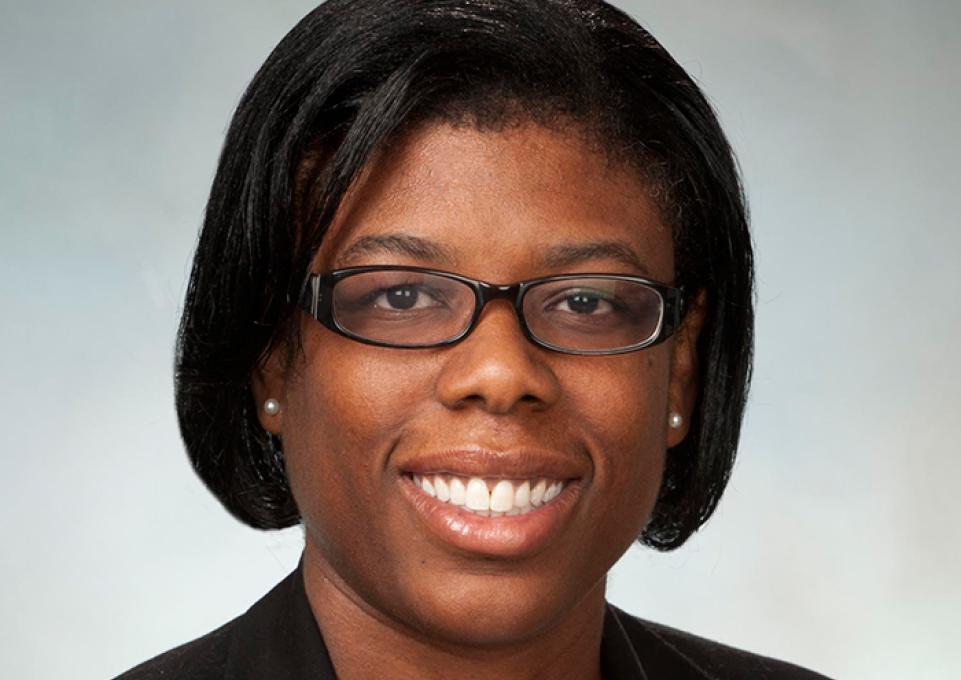
The American Association of State Colleges & Universities (AASCU) selected Buffalo State’s Amitra A. Wall for the inaugural class of its Emerging Leaders Program (ELP). Wall is a sociology professor who also serves as assistant dean of intellectual foundations and first-year programs and as the interim chair of the Political Science Department.
Wall will join 25 other promising mid-career higher education professionals and faculty leaders from across the country for a seminar June 11–14 in Washington, D.C. The participants will have opportunities for hands-on practical exercises, a leadership self-assessment, and the development of a plan to help them achieve their leadership goals.
“We need a robust pipeline of talented professionals interested in advancing their careers in higher education,” said AASCU President Muriel A. Howard, who served as Buffalo State president from 1996 to 2009. “AASCU has a long history of providing successful leadership development programs at every professional level of higher education administration. We identified a void at the mid-career level, and we believe our new Emerging Leaders Program will be an important complement in service to our members and others interested in advancing their careers.”
Mark Severson, dean of the School of Natural and Social Sciences, nominated Wall for inclusion in ELP.
“I believe that Dr. Wall has a strong potential to increase the positive impact she’s had on the success and attainment of students by taking on broader leadership roles,” Severson said. “The program will provide her with a valuable professional development opportunity that will help her to move forward in her career in academic leadership. Buffalo State and our students will benefit greatly from her increased contributions.”
Upon completion of the program, participants will identify a project, initiative, or assignment that will expand his or her knowledge of the university and facilitate growth as a leader.
Wall already has selected the Murky Middle Project, which aims to decrease attrition among students with a grade point average (GPA) between 2.0 and 3.0.
“Research shows that second-semester students within this GPA range are highly ignored and more than half drop out of college in their second year or later,” Wall said. “They’re not ‘at-risk’ and are not in honors programs so they have been largely neglected. The purpose of the project is to identify strategies to retain this subset of students.”
Severson said this project is particularly relevant to the work of Buffalo State’s Presidential Committee on Undergraduate Retention.
“The retention committee has focused on first-year students during its initial year of work. However, we also recognize the importance of addressing the issues of second- and third-year students who are at risk of not completing their education,” Severson said. “Professor Wall’s planned project will lead to the development of materials that can be used by advisers, instructors, and students. It will be widely distributed and will be of great utility in beginning to come to grips with this important subset of students.”
About Amitra Wall
A native of Buffalo, New York, Wall grew up in Fort Worth, Texas, and earned her bachelor’s, master’s, and doctoral degrees from Texas Woman’s University. She joined the Buffalo State sociology faculty in 2000 and coordinated the woman’s studies interdisciplinary minor program. In 2010, she was certified as an applied sociologist by national and international colleagues from the Association for Applied and Clinical and Sociology. In 2011, she received SUNY’s Chancellor’s Award for Excellence in Teaching. In 2015, she was elected a commissioner for the Accreditation of Programs in Applied and Clinical Sociology (CAPACS), which allows her to participate in site visits for the purpose of accrediting postsecondary programs in applied, clinical, and engaged public sociology and sociological practice.
About AASCU
The Washington, D.C.-based higher education association of more than 400 public colleges, universities, and systems provides a venue for members to share a learning- and teaching-centered culture, a historic commitment to underserved student populations, and a dedication to research and creativity that advances their regions’ economic progress and cultural development.
